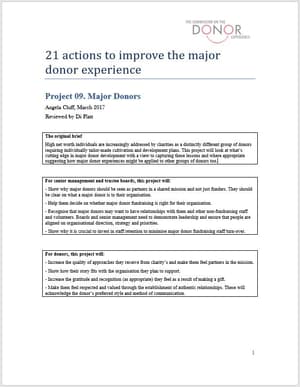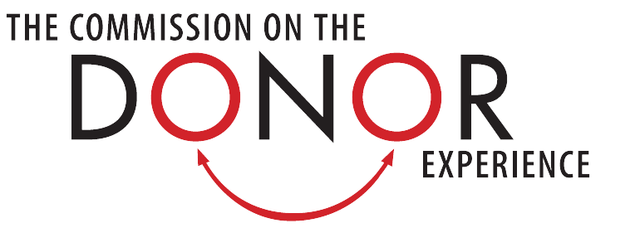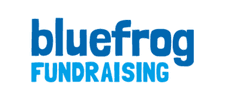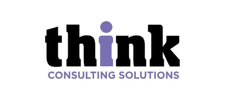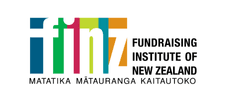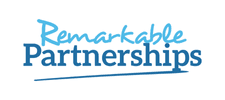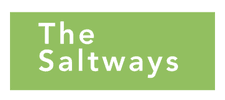CDE project 9: putting the principles and actions into practice — part 2
- Written by
- The Commission on the Donor Experience
- Added
- April 28, 2017
2. Deciding whether major donor fundraising is really right for your organisation
Back in 2010, Beth Breeze, in a think piece for NCVO’s Funding Commission[18], argued that by 2020 the relationship between donors and charities should be turned on its head—and that donors ought to be understood as the centre of the charity universe.
In the same piece, Beth quoted Paul Schervish (Boston College): ‘The accepted wisdom that charities need donors in order to help them achieve their organisational mission, ought to be replaced by an understanding that donors choose to support charities in order to achieve their personal missions.’
This is profoundly challenging for some organisations. As one fundraiser expressed it (anonymously):
‘My organisation wants major donors to fund the work in the organisational plan, ask no questions, give us the money and then leave us alone to get on with it’.
Below are three extracts from Case Studies in the 2015 Coutts Million Dollar Donor Report for the UK[19]. Each of these underlines the idea that major donors do not want to simply write cheques. Rather, they see themselves as partners in achieving a shared mission: providing financial resources but also having hands on involvement.
‘If we want to be material donors we tend to get quite heavily involved. We’re very clear, however, that we do this exclusively at the invitation of the organisation, and on the basis that giving is about ‘enabling’, not “influencing”. This is a key distinction which needs to be well articulated.’
Rory and Elizabeth Brooks, The Rory and Elizabeth Brooks Foundation[20]
‘The Foundation has given more than £1m to quite a few projects. But we don’t focus on the money – it’s about finding ways to help young people. Philanthropy goes wrong if you only give money… So we have given a lot of “million pound donations”, but as I said, none of these are about the money, it’s about finding ways to help young people believe that “if they think they can, they can” – the foundation’s motto.’
Jack Petchey CBE, the Jack Petchey Foundation [21]
‘Whether we give for capital or core costs, I believe there’s a lot beyond the money that we add, in terms of our thought process and engaging with organisations to help them do what they do better. We like to be more than just the money – the money’s obviously very important, but there’s something transactional about a capital grant, particularly if it’s not an organisation we’ve developed a relationship with. It feels more comfortable when we’ve known them for five or more years and there’s a good understanding on both sides.’
Trevor Pears, the Pears Foundation[22]
Perhaps the ultimate litmus test of whether major donor fundraising is right for your organisation is whether you want and are able to successfully build a fundraising or development board: a group of individual donors and supporters who commit to raising a specific sum of money, often for a particular purpose, in a given timeframe. Such senior volunteer fundraisers really do see themselves as partners of the organisation and its leadership to deliver a special and often transformational result.
Although some donors and supporters are powerfully motivated to give and then fundraise and encourage others to give, often motivated by a very strong personal connection to the cause; others are more reticent. However, ‘enough’ donors and supporters will fundraise to achieve a goal that they are committed to and passionate about, alongside an organisation they believe will deliver. Many organisations attempt volunteer fundraising through a fundraising or development board. Not all who try succeed. Those that do succeed usually do so because they build a genuine partnership focused on a specific goal.
None of this is to say that the answer to a major donor is always ‘yes’—and it is vital never to say ‘yes’ because it is easy at the time. Organisations can and do say ‘no’ to things that they cannot do or are not in line with mission or strategy. The key is being willing to have the conversation openly and honestly.
In summary, the donor experience can go badly wrong if donor and organisational needs are mismatched. If you don’t want involvement alongside money, then major donor fundraising may be the wrong choice for you. In short only choose major donor fundraising if you are prepared to meet the needs and interests of major donors.
As Sharon Jackson explains, it can be the right choice for both small and large organisations:
‘To fully explore this income stream our entire organisation needs to understand the degree of commitment required, needs to make the necessary commitment and needs to then deliver on that commitment.’
Sharon Jackson, Consultant
For some organisations, it can be the right choice to partner with major donors on particular aspects of the programme, rather than attempt it for the complete range of work. This approach can offer a way for an organisation to ‘grow into’ major donor fundraising.
Here is Sharon’s longer discussion on choosing major donor fundraising:
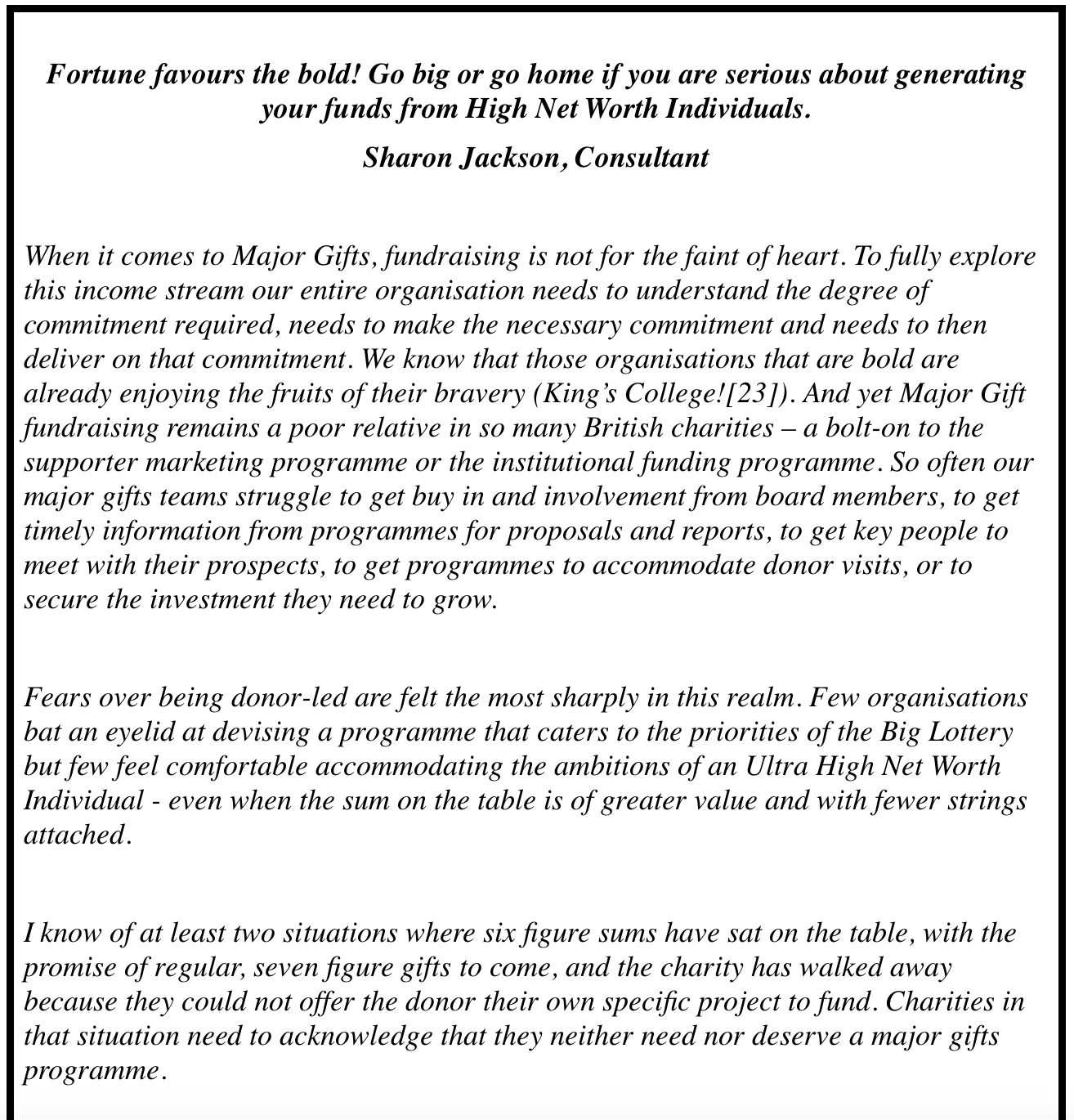
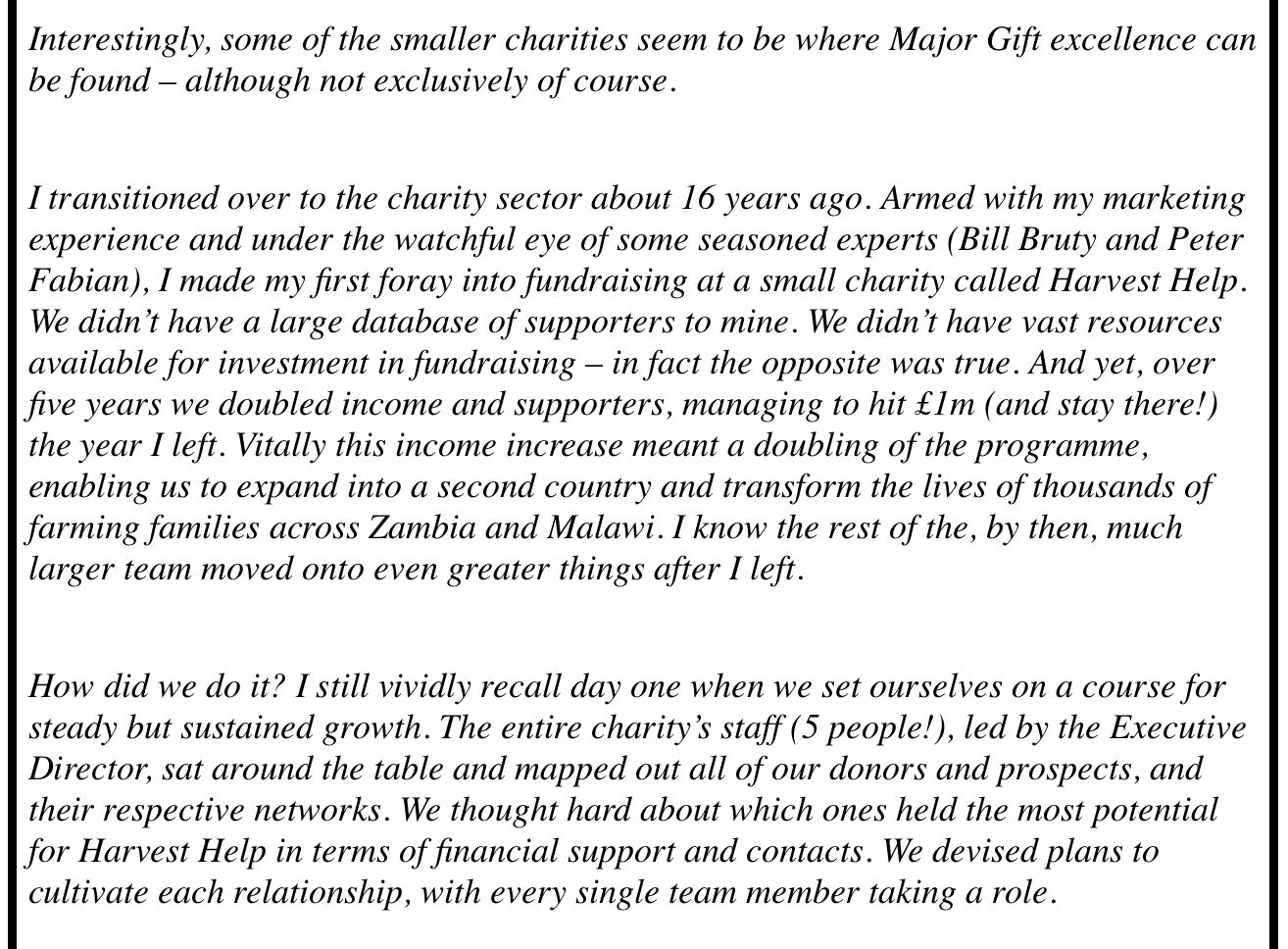
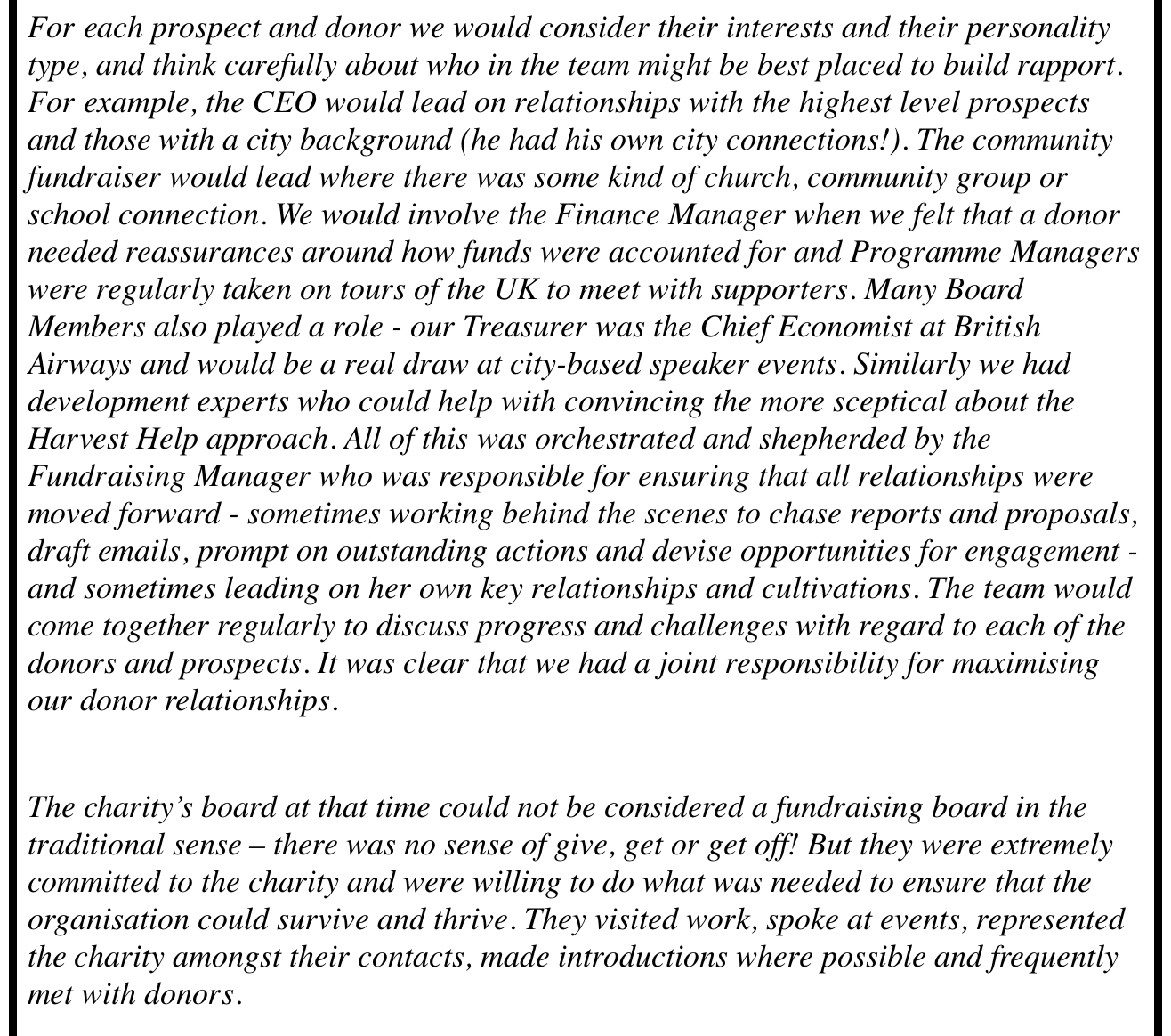
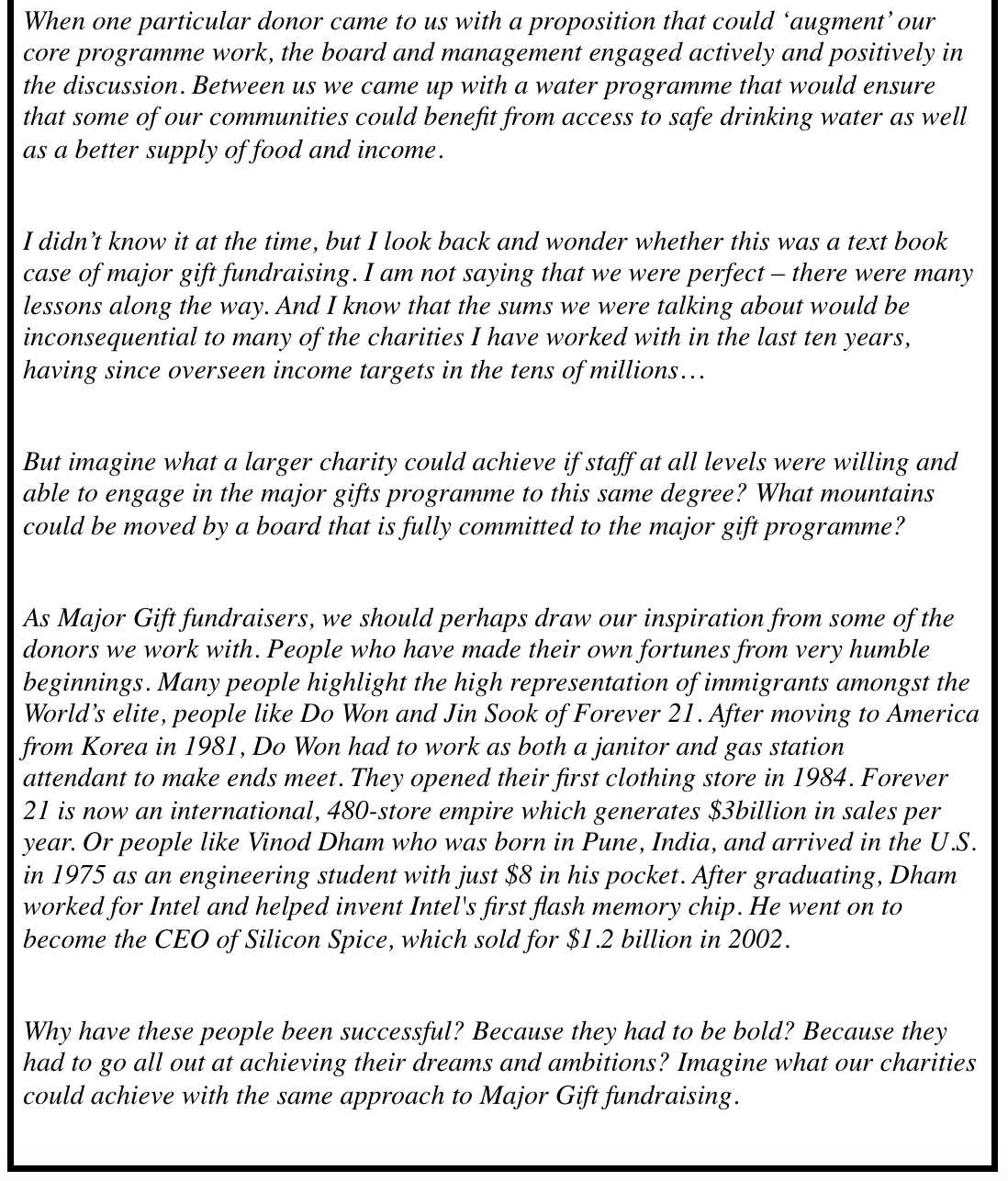
---------------------
[18] http://socialwelfare.bl.uk/sub...
[19] http://philanthropy.coutts.com...
[20] http://philanthropy.coutts.com...
[21] http://philanthropy.coutts.com...
[22] http://philanthropy.coutts.com...
[23] King’s College London's World questions| King’s answers fundraising campaign closed inspring 2016,having raised more than £600m. The original target of £500m was reached 18 months ahead of schedule. See https://alumni.kcl.ac.uk/give-back/world-questions- kings-answers


